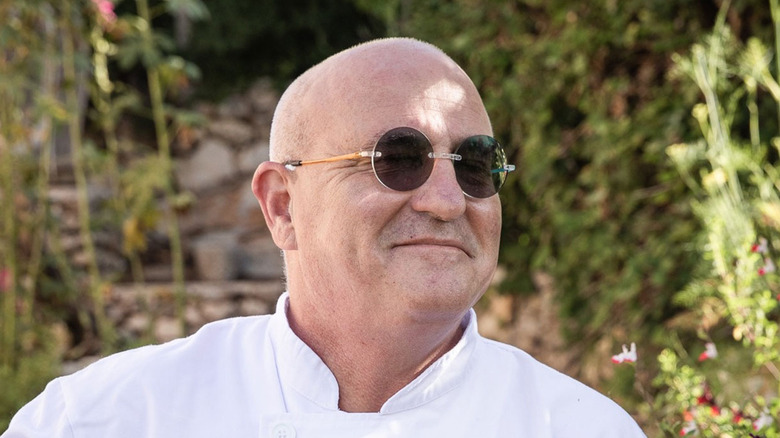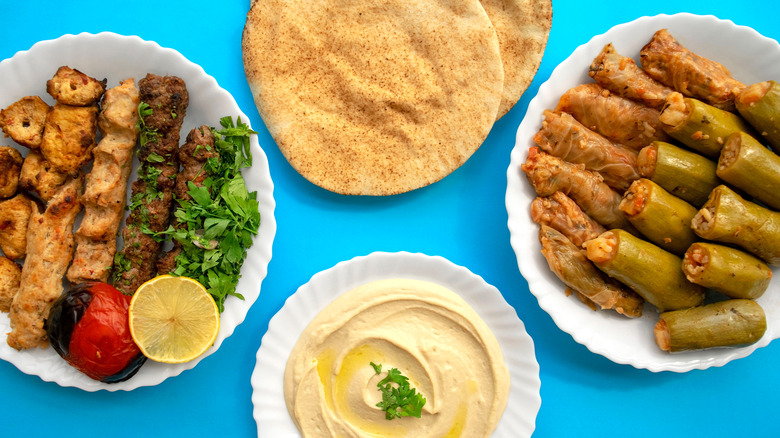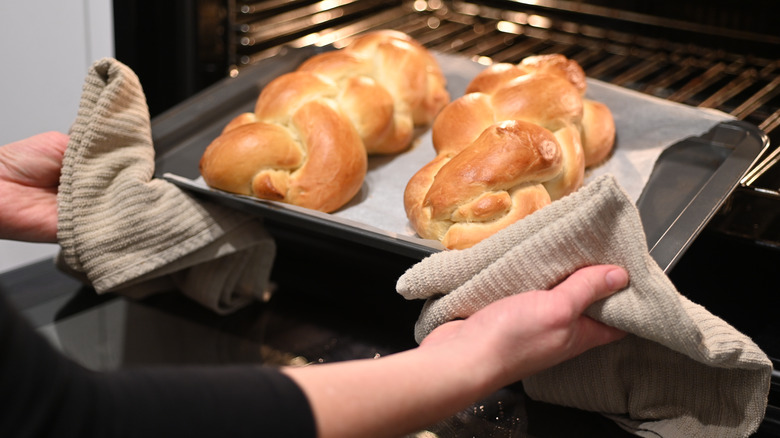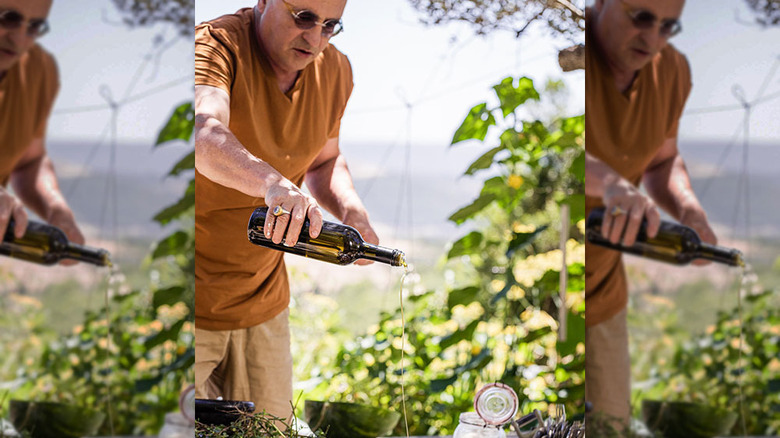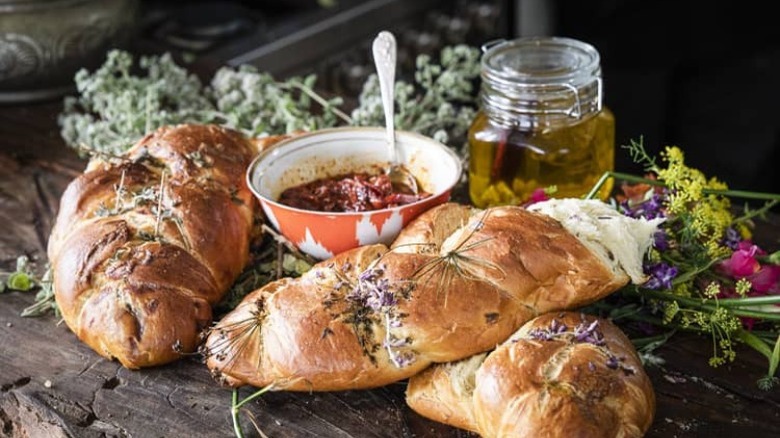Chef Erez Komarovsky Talks Israeli Food And YesChef - Exclusive Interview
When you hear the words, "Israeli food," does your mind immediately turn to hummus and falafel? If so, you're certainly not alone — but, these popular dishes don't accurately represent the complex constellation of ingredients, cultures, and even religions that give foods coming from this Israeli their unique flavors and textures. So says Chef Erez Komarovsky — who, with the nickname, "The godfather of Israeli cuisine" – ought to know.
In an exclusive interview with Mashed, the award-winning chef and founder of Israeli bakery chain Lehem Erez explained the unique history of food from Israel and its neighboring countries — and why "Israeli food" is not the same thing as "Jewish food." Komarovsky, who has styled food for Wolfgang Puck, also shared baking advice, and offered insights about why online cooking classes have become the next "big thing" in foodie culture. (And, as the host of a cooking class on YesChef, he should know a thing or two about that, too!)
What Erez Komarovsky wants Americans to understand about Israeli cuisine
What are some Israeli dishes that Americans should try?
I think a large part of Israeli cuisine is cooked slow ... Both in the North African cuisines and in Turkish-originated cuisine, large Syrian cuisine, the Shami cuisine, and from all over, actually — Iraqi and stuff. This is more handmade, kind of a stuffed thing, small veggies. I think this is not popular enough in the States, I think.
[For example], slowly cooked lamb with dried fruits. Mansaf, for example. Maqluba for example. This is all from different [regions] and wonderful, wonderful dishes that are very popular in Israel — mainly popular in the home cooking with the grandmothers. But it [goes] into the fine cuisine in restaurants, in high-end restaurants. This is something that we do a lot, slow cooking over fire, slow cooking in a wood-fired oven. This is something that we do all the time.
Is that different from the kinds of Israeli food Americans typically eat?
I think for the Americans, Israeli cuisine means only... lemon juice, garlic, tomato, and chili. I think this is only [a] small part of our repertoire.
People do tend to think of Israeli food as Mediterranean food like hummus and couscous. Why is that not the full story?
Let's be honest. Israeli cuisine is... also from dishes that my grandmother brought with her from Poland. It consists also from someone's, say, Persian grandmother's recipes. So it's not only Mediterranean, not at all.
We have herring sandwich, [which] is something that is very, very Israeli. It became very Israeli. It almost died because there was a time where Ashkenazi cuisine was considered to be [a] dinosaur and was looked upon as a "gray food" with no flavor. Now, we are starting to use our heritage also and introducing it into what you call "Mediterranean." The difference between kreplach and shish barak is the dough. It is very similar, very similar. The usage of it is different, but nowadays, we can do shish barak with the same stuffing as kreplach, and put it into a chicken stock and make something completely new.
Or I'm doing the grilled chopped liver with chopping in mortar and pestle and make it very rustic. They bring the smoke of the fire of the wood into the chopped liver. We are doing interesting stuff nowadays in Israel!
The difference between Israeli and Jewish cooking, according to Erez Komarovsky
Many traditionally Jewish foods, like herring, are not served in American restaurants. Do you think they should have a place on our menus?
I think it's being discovered right now. I think challah bread is having a renaissance. I think babka is having a renaissance. I think it's not only in the baking world, it's also ... Let's [not] forget the chicken soup ...I think the difference between the way Israelis consider Israeli cuisine and Americans consider Israeli cuisine [is] that Americans see Israeli cuisine as "Jewish cuisine." Israelis don't look at the Israeli cuisine as only Jewish. It's also Muslim. It's also Christian. It also draws all the population that live in Israel. This is a major difference between the concept of our ... the way we look at our food and the way Americans look at the food. Because Israeli cuisine was considered, for many years, in the States as a "cuisine of my grandmother," the chopped liver, the kreplach — and it's not anymore. It's all having a little renaissance also now in Israel. I'm trying to do new things with it!
Will you be rediscovering traditional Jewish dishes in your YesChef online cooking course?
I think what we did for Yes Chef — we did exactly that! We did challah, but we did it in a different way, in a more modern way, in a more younger and cooler and up-to-date [way], but also more connected to nature. We did also shakshuka ... There is Arabic influence and there is a Polish influence. It's very interesting, I think.
We couldn't shoot all of what we wanted to do, but I think YesChef ... gave me and later the audience, of course, a wonderful glimpse of how simple it is to cook Israeli cuisine, how fresh it is, how tasty it is, and how healthy it is. I hope that we succeeded to give the audience a better understanding of what we do in Israel nowadays.
Why Israel is a great culinary destination, according to Chef Erez Komarovsky
People all over the world go to Israel for spiritual reasons, but why is Israel also a great culinary destination?
I think because we have a lot of chutzpah. Because we don't have one heritage. We don't have one tradition. Israeli cuisine is a complete idiosyncratic ... a mix of so many different culinary cultures that can happen only when they live together. In Iraq, kubbeh is cooked the way kubbeh is cooked for centuries. In Turkey, fish is cooked the way it is cooked for centuries. In Israel, where an Iraqi housewife or chef meets a Turkish neighbor, and they start giving one another to taste — then suddenly, the Iraqi chef is influenced by a small technique or a small flavor, or introduces a different spice that his mother has used, and he is allowed to do it because all of us are doing it.
I can start the dish with Iraqi or Palestinian, I don't know, bread. I mix it with Iraqi amba and I serve it with a yogurt. That is completely not allowed with [kosher cooking rules that] make it [forbidden] in the Jewish tradition.
Chef Erez Komarovsky looks back on his time cooking in Las Vegas and in the Mediterranean
You collaborated on a cookbook with Wolfgang Puck in Las Vegas. What was that like?
I was a food stylist and we made the shoot in Las Vegas where they had the restaurant. It was fun. [Wolfgang Puck was] strong and he knew what he wanted, and a professional, what can I say? A professional, very "pro." [I styled] ... desserts, kind of cakes and stuff, desserts mainly. Sweet, sweet, sweet.
Are desserts your favorite food?
No, no, no, completely not. I am a savory type of guy. I prefer savory both in morning and evenings. But it was very interesting for me to see the professional, the pastry department in the restaurant. It was amazing to see. All those big restaurants that used to be in the late '80s, early '90s, stars, and big restaurants, so it was interesting to see.
What was it like to work as a chef in Las Vegas?
Las Vegas is a crazy city. I work[ed] there. I didn't live in the restaurant. We were shooting. At the time, I didn't have time to roam around. Actually, to tell you the truth, [gambling] didn't interest me. I'm a nature kind of a guy. I take my inspiration from nature and from agriculture. That's where I get my inspiration, not from gold, glitters, and the slot machine.
What types of places do inspire your cooking?
I think I had many, many, many places that inspired me immensely, but it's moments [I remember]. For example, in this year, the most inspiring one is the moment that you recollect the most. It means that it's the last thing that you did.
Two weeks ago, I cooked in Paros — I cooked in Crete, a wonderful wedding where we really roasted all baby lambs and did wonderful seafood on the beach. The nature in Greece, in the islands, is very strong. You live by the sea and then you see herbs that I didn't know [existed]. For example: fennel. That is very Greek, but I discovered that we have it in Israel, but we don't use it. It grows by the sea. For me, to meet a different culture and to taste new flavors and to see different veggies that grow and to cook with them ... I love cooking when I go abroad! So for me, the last one is the most important one.
Why foodies are obsessed with online cooking classes, according to Chef Erev Komarovsky
You are teaching an online cooking course through YesChef. Do you think Yes Chef and other online cooking programs have become more popular because of the pandemic?
I guess it is, yes. [They are] more popular because of the pandemic, but I think they became more popular because they think it's more personal than a TV show. When I am [watching a] TV show, and it's a viewed show and reality and big time and drama and this and that — here, there is no drama. You are focused on showing your audience why you love food, why you cook it.
I am trying to so that they can share my love and be part of my life also. This is what YesChef is doing. It's also [a documentary], okay? It's like the podcast of cooking, but it's kind of a film podcast.
How is YesChef different from other online cooking programs?
[With other programs], here is the chef's table and there is docu[mentary]. [What], I think, differs YesChef from all other applications because it connects both those two extremes into one, and it's interesting. It's interesting to see the life of [a chef] but also, a way of cooking. Usually, you see either or the other.
Chef Erez Komarovsky offers baking and cooking advice
What is your best advice for the everyday cook or baker?
Be free to do whatever you want and feel free to do whatever you want. Don't follow recipes like they are the Bible. Just feel free and be happy in the kitchen. Don't take no for an answer from anything and from any ingredient.
What do you mean by "don't take no for an answer"?
If you don't succeed the first time, try a second time, try a third time. I've been baking for 30 years now and it's obvious that in the beginning, I didn't succeed to make good bread, but it... didn't paralyze me. It just energized me. I wanted to do better. I tried again and again and again and again. Be obsessive about it.
What is your favorite type of food to cook?
Ah, wow. It depends on the season. It depends on the season and where I am. If it was in Greece, on the beach or on the boat, it's obvious that I wanted to cook sea urchins and octopus. When I am in the summertime, in my garden, it's obvious that I want to do tomatoes. I want to roast the tomatoes because the tomatoes in summer in Israel — it's amazing! Or chilies. But if it's wintertime, I want to do cauliflowers and kohlrabies. It depends on the season. My way of cooking, it's completely seasonal. I do not use cauliflower in the summer and I am not using tomatoes in the winter.
As the owner of the Lehem Erez bakery and cafe, you are well-known for your bread. What is your favorite type of bread to bake?
I think when I was younger, I love doing sourdoughs. But now, I think flatbreads. Flatbreads because I have my wood-fired ovens in the garden under the oak trees. I feel the nature, and I'm outside, and it's more romantic. Also, I think it's more connected to the heritage of the way people bake breads here in Israel, here in the Mediterranean. It was more flatbreads.
Do you think the everyday cook could learn to bake a flatbread?
It's easy. It's the easiest bread to bake really. Just usually flatbread [needs] the hydration, but then if you do pita bread, it's not hydration. Sometimes, people are afraid to bake a pita in a regular oven because it's not warm enough, but I succeeded to show also in YesChef how to bake pita bread in a skillet. I think it's very important to understand that it's easy to bake... flatbread, really easy. You don't need a huge wood-fired oven. If you don't have everything, if you live in New York and you don't have it, okay — you can do it in a regular skillet, and it's nice!
If you're interested in learning Israeli cooking, you'll definitely want to check out Chef Erez Komarovsky's class on the roots of Middle Eastern cuisine over at YesChef.
